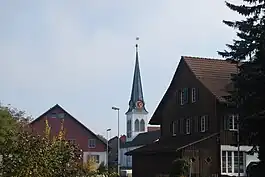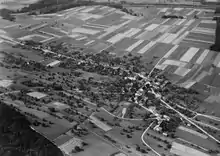Thalheim an der Thur
Thalheim an der Thur is a municipality in the district of Andelfingen in the canton of Zürich in Switzerland.
Thalheim an der Thur | |
|---|---|
 | |
 Coat of arms | |
Location of Thalheim an der Thur | |
 Thalheim an der Thur  Thalheim an der Thur | |
| Coordinates: 47°35′N 8°45′E | |
| Country | Switzerland |
| Canton | Zurich |
| District | Andelfingen (district) |
| Government | |
| • Mayor | Gemeindepräsident Peter Wettstein Ind. (as of 2008) |
| Area | |
| • Total | 6.44 km2 (2.49 sq mi) |
| Elevation | 385 m (1,263 ft) |
| Population (31 December 2018)[2] | |
| • Total | 917 |
| • Density | 140/km2 (370/sq mi) |
| Time zone | UTC+01:00 (Central European Time) |
| • Summer (DST) | UTC+02:00 (Central European Summer Time) |
| Postal code(s) | 8478 |
| SFOS number | 0039 |
| Surrounded by | Adlikon, Altikon, Dägerlen, Dinhard, Neunforn (TG), Ossingen |
| Website | www SFSO statistics |
History
Thalheim an der Thur is first mentioned in 1166 as Torlinchovin. In 1257 it was mentioned as Torlinkon. Until 1878 it was Dorlikon.[3] The name may have originated from the Alamanni name Torilo which originated in the 7th century. However, as this name could easily be taken to mean "Fools' Village" (from the nowadays old-fashioned expression Tor, German for "fool"), the community was granted a name change to Thalheim an der Thur in 1878. The original name is still used in the area.

Geography
Thalheim an der Thur has an area of 6.4 km2 (2.5 sq mi). Of this area, 65.7% is used for agricultural purposes, while 21.9% is forested. Of the rest of the land, 9% is settled (buildings or roads) and the remainder (3.4%) is non-productive (rivers, glaciers or mountains).[4]
The municipality, in contrast to its name, does not lie on the Thur river, but rather to the south. In 1862, the first bridge was built over the Thur. 14 years later, it was ruined by a flood and was rebuilt three years later. In 1875, the Winterthur–Etzwilen railway line was opened bringing the connection with the outside world.
Demographics
Thalheim an der Thur has a population (as of 31 December 2020) of 949.[5] As of 2007, 5.8% of the population was made up of foreign nationals. Over the last 10 years the population has grown at a rate of 23.3%. Most of the population (as of 2000) speaks German (93.1%), with Portuguese being second most common ( 2.0%) and Albanian being third ( 1.3%).
In the 2007 election the most popular party was the SVP which received 57% of the vote. The next three most popular parties were the FDP (9.9%), the CSP (9.1%) and the SPS (8.6%).
The age distribution of the population (as of 2000) is children and teenagers (0–19 years old) make up 23.5% of the population, while adults (20–64 years old) make up 65.9% and seniors (over 64 years old) make up 10.5%. In Thalheim an der Thur about 79.8% of the population (between age 25-64) have completed either non-mandatory upper secondary education or additional higher education (either university or a Fachhochschule).
Thalheim an der Thur has an unemployment rate of 1.91%. As of 2005, there were 75 people employed in the primary economic sector and about 20 businesses involved in this sector. 29 people are employed in the secondary sector and there are 8 businesses in this sector. 42 people are employed in the tertiary sector, with 13 businesses in this sector.[4] The historical population is given in the following table:[3]
| year | population |
|---|---|
| 1637 | 289 |
| 1707 | 480 |
| 1799 | 442 |
| 1850 | 561 |
| 1900 | 469 |
| 1950 | 433 |
| 2000 | 637 |
Transport
Thalheim-Altikon railway station is served by Zurich S-Bahn line S29, which links Winterthur and Stein am Rhein.[6][7]
External links
- Characteristics of the municipality (in German)
- Official website (in German)
- The place name of Dorlikon
References
- "Arealstatistik Standard - Gemeinden nach 4 Hauptbereichen". Federal Statistical Office. Retrieved 13 January 2019.
- "Ständige Wohnbevölkerung nach Staatsangehörigkeitskategorie Geschlecht und Gemeinde; Provisorische Jahresergebnisse; 2018". Federal Statistical Office. 9 April 2019. Retrieved 11 April 2019.
- Thalheim an der Thur in German, French and Italian in the online Historical Dictionary of Switzerland.
- Swiss Federal Statistical Office accessed 28-Jul-2009
- "Ständige und nichtständige Wohnbevölkerung nach institutionellen Gliederungen, Geburtsort und Staatsangehörigkeit". bfs.admin.ch (in German). Swiss Federal Statistical Office - STAT-TAB. 31 December 2020. Retrieved 21 September 2021.
- map.geo.admin.ch (Map). Swiss Confederation. Retrieved 2012-03-05.
- "S-Bahn trains, buses and boats" (PDF). ZVV. Archived from the original (PDF) on 2012-01-31. Retrieved 2012-03-05.